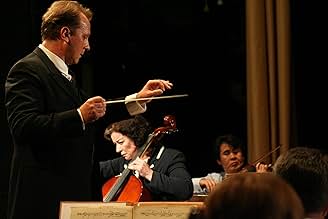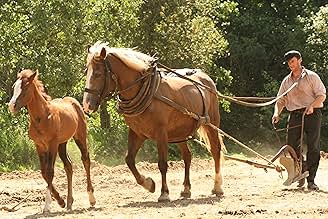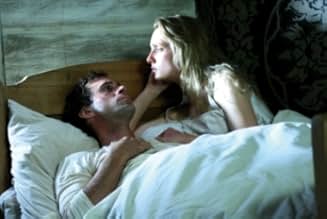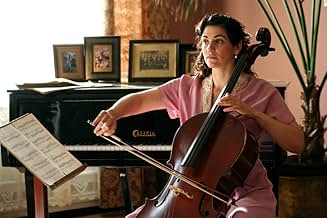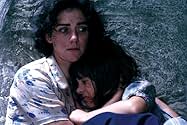Füge eine Handlung in deiner Sprache hinzuSuccessful doctor Artur Planck, his wife Clara and their two daughters are seeking shelter from the Nazis storming Poland. A violent love triangle ensues between Arthur, Clara and Emelia, th... Alles lesenSuccessful doctor Artur Planck, his wife Clara and their two daughters are seeking shelter from the Nazis storming Poland. A violent love triangle ensues between Arthur, Clara and Emelia, the woman they are taking shelter with.Successful doctor Artur Planck, his wife Clara and their two daughters are seeking shelter from the Nazis storming Poland. A violent love triangle ensues between Arthur, Clara and Emelia, the woman they are taking shelter with.
Empfohlene Bewertungen
9Nozz
The filmmakers went to the trouble of shooting much of this movie in Poland, and maybe they benefited from something invisible in the atmosphere but there is rather little happening outdoors in the movie and I couldn't have told whether it was shot in Poland or in Poughkeepsie. Because so much of the film occurs in the small space of a peasant's hut, you could mistake it for a stage play with a few cinematic scenes tacked on. And the screenwriter, Motti Lerner, does in fact write mostly for the stage. It could be that audiences were surprised by the relative weight of the indoor part of the story, where everything depends on the interaction of the actors and their movement in a space no bigger than a stage; and by the relative weight of the interplay between the characters living in fear of the Nazis, as opposed to actual encounters with the Nazis themselves. But if you accept that the emphasis lies where it does, then you'll certainly be glad that for once Uri Barbash directed a script by an independently successful playwright rather than by his brother Benny (no offense intended). The actors do a great job of selling the story, and the script does a great job of showing a human dilemma of conflicting priorities with life and death at stake.
A very well acted emotional story illustrating the atrocities of the Germans in WWII. I found some of the scenes very disturbing though thought provoking as to what depths the human race can sink to. Films like this must be made to capture new generations who far too often are ignorant of history or have history glossed over to maintain current day international relations and sensitivities.
This is a serious portrait of the suffering, pain and sacrifices of hideous Nazi occupation & the Jewish people.
I like the story unveiled by surviving Madam Planck 30 years later... the movie switches between the occupation to her finally sharing w her daughter of that life and village.
It is moving, only Emilia storyline too long, (time could have been spent on other aspects). We get the point early on that she is going to push too far, with tragic results to haunt her. Then the villager drunk cousin - too much of him. There was room to have one or two more characters in the story, versus overly drawn out storytelling like that.
Well worth watching - an earnest movie.
I like the story unveiled by surviving Madam Planck 30 years later... the movie switches between the occupation to her finally sharing w her daughter of that life and village.
It is moving, only Emilia storyline too long, (time could have been spent on other aspects). We get the point early on that she is going to push too far, with tragic results to haunt her. Then the villager drunk cousin - too much of him. There was room to have one or two more characters in the story, versus overly drawn out storytelling like that.
Well worth watching - an earnest movie.
More than a bit disappointed this wasn't a very realistic war drama actors hammering out lines in English with odd stilted vaguely Slavonic accents thrown in. Then the laborious romance matters then seemed to draw a veil over what was left of the realism in the movie
and I'm sorry but with the milk maid plunging visuals I didn't need a 'We are Slavic' soundtrack to imagine that fantastic erotically charged Polish trash-pop entry in Eurovision 2014. It nearly won. Anyway. Then the flash forwards elements make use of over simplistic visual references - yes, it's the same place, again... And is there enough prosthetics? A shortage?
I have seen many World War II documentaries and movies. Even more on the German caused Holocaust. Although this isn't focused on concentration camps like most of them are, this for some reason depicted the Jewish pain better than most.
Wusstest du schon
- Crazy CreditsLeszek Lichota is credited as SS Sergeant in the end credits, although in the film he is clearly a Heer Oberleutnant.
Top-Auswahl
Melde dich zum Bewerten an und greife auf die Watchlist für personalisierte Empfehlungen zu.
- How long is Spring 1941?Powered by Alexa
Details
Box Office
- Budget
- 2.500.000 $ (geschätzt)
- Laufzeit
- 2 Std.(120 min)
- Farbe
- Sound-Mix
Zu dieser Seite beitragen
Bearbeitung vorschlagen oder fehlenden Inhalt hinzufügen


